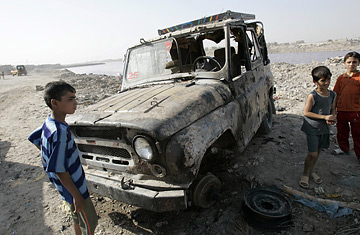
Children stand near a burnt vehicle after a U.S. military air strike in Baghdad's Sadr City August 8, 2007.
Wednesday's raid in Sadr City targeting a so-called "secret cell" of Moqtada Sadr's Mahdi Army was a reminder that even as they press their campaign against al-Qaeda aligned Sunni militants, U.S. forces are ramping up operations against what they see as a more serious long-term threat: Shi'ite militias supported by Iran. The attack killed, by the U.S. military's count, 30 men allegedly involved in receiving weapons and training from Iran. Attacks of that scale in the militia's stronghold are not unheard of, but they are rare. Since the two sides declared a truce in 2004, the Americans — mindful of the militia's power and of the political clout its political wing wields in the government of Prime Minister Nouri al-Maliki — have tried to limit the Mahdi Army's influence without provoking an all-out confrontation.
The fact that the latest raid came on a day when al-Maliki was in Tehran for talks underscored the fact that the U.S. may now be turning toward a more aggressive posture against elements of Sadr's militia. Al-Qaeda in Iraq remains a formidable threat; a senior U.S. military official in Baghdad called it the organization most likely to push Iraq's vicious sectarian conflict into a full-blown civil war. But American efforts to turn tribal leaders and armed Sunni groups against the jihadists in their midst have borne fruit in the security realm this year, although such groups remain harshly critical of the Maliki government. That government has made no discernible progress bringing Shi'ite militia groups under control, and is now contending with multiple defections and the possibility of being brought down by a no-confidence vote.
Until now, Shi'ite militiamen have evaded the punishing attention the U.S. and Iraqi forces have lavished on Sunni insurgents, and have maintained a very strong presence within the Iraqi police and army. The policy of waiting for the government to resolve the militia problem has passed from the realm of wishful thinking and into the realm of fantasy, and the U.S. military now appears more inclined to take strong action.
Meanwhile the Mahdi Army has ramped up its attacks against American troops and the Iraqi security forces. According to the same U.S. military official, Mahdi Army cells with Iranian backing were responsible for 75% of U.S. and Coalition deaths last month. The Americans contend that the Mahdi Army, which sprang up in 2003 as a nationalist militia opposed to both the U.S. occupation and Iranian interference, has since become heavily influenced by Tehran.
While al-Qaeda and its affiliates pose the greatest threat to Iraqi civilians, the U.S. military official says "the far more dangerous long-term threat comes from within the Shi'ite militias." He said the current trajectory risked creating an Iraq in which the "the government is not in control of the state." Iran sheltered most of the leadership of the current Iraqi government, and Shi'ite politicians maintain that relationship. So, some Iranian influence in Iraq is inevitable. But the presence of a Hizballah-style armed group, more powerful in some areas than the national government and receiving weapons, training and guidance from Iran, is a threat of a different order. It creates a more dangerous battle for U.S. troops in the short term, and would greatly strengthen Iran's position in Iraq in the long term.
The disapproval of Iraq's Shi'ite-dominated government remains a serious obstacle to any sustained American effort to defang the Mahdi Army. Just as it has done after similar raids in the past, the Iraqi Ministry of Defense said Wednesday that it had no knowledge of the American attack in Sadr City. So, while the military equation may have changed for the Americans, Iraq's political realities have not.
